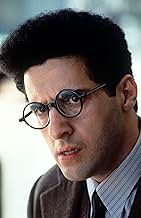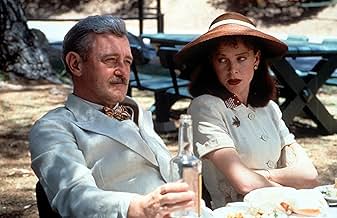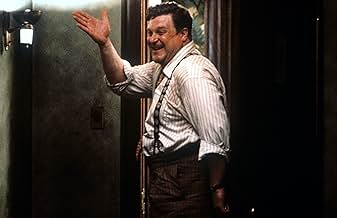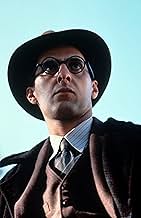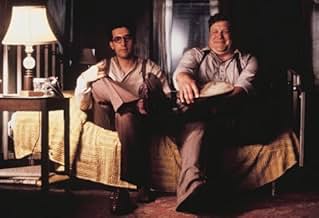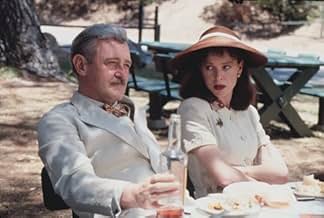Un famoso dramaturgo neoyorquino se ve tentado a trasladarse a California para escribir guiones de películas y allí descubre la realidad infernal de Hollywood.Un famoso dramaturgo neoyorquino se ve tentado a trasladarse a California para escribir guiones de películas y allí descubre la realidad infernal de Hollywood.Un famoso dramaturgo neoyorquino se ve tentado a trasladarse a California para escribir guiones de películas y allí descubre la realidad infernal de Hollywood.
- Nominado a 3 premios Óscar
- 19 premios ganados y 29 nominaciones en total
Meagen Fay
- Poppy Carnahan
- (as Megan Faye)
- Dirección
- Guionistas
- Todo el elenco y el equipo
- Producción, taquilla y más en IMDbPro
Opiniones destacadas
I knew I was entering the world of the insane when I picked this up. I wasn't disappointed. This is a dark comedy where people don't talk to each other, they just talk. Barton Fink is a big phony one hit wonder. He has these high ideals which he really doesn't understand. He's unable to see the forest for the trees. When he meets John Goodman's character, Charlie, he has an opportunity to find his muse, but he doesn't even listen. When he does, it's too late. The events of this film are wonderful, from Barton's speeches and his block. To Mayhew, the ersatz Faulkner, who drinks constantly and screeches. Barton Fink is so unlikeable that we don't even care what happens to him in other than a casual way. Goodman steals every scene he is in and ends up so much more that originally thought. This is a movie about taking everything to a higher pitch. It's about the artist and the dilettante. It's about the movies being a purely commercial enterprise. Wallace Beery is the king of the screen. It's a wrestling movie. For God's sake, they're asking for so little. Barton Fink is a whiny loser and he pays the price. The Coens are, without a doubt, the most refreshing thing of the last two decades.
The Coen brothers have come a long way from their start with an 8mm camera. They have written and produced some great homages to the film noir era of Hollywood, and this film is no exception.
First, is the great dialog written by the brothers. Great dialog is a feature of their films, and this one has some of the most memorable I have heard. You can almost turn off the visual and just listen and be enchanted and know you are listening to a Coen brothers film.
But turning off the visual would deprive you of the great cinematography of Roger Deakins. His can frame a scene to the point that you could pause the film and just soak in the texture and color and realism. It is almost as if every frame is a painting.
The Coen brothers also seem to get the best performances out of an actor that I have seen. John Goodman is brilliant in this film and he seems to do his best work for the Coens. John Turturro is captivating as the hack writer who talks about his love for the common man, but just really doesn't know the common man and really doesn't care about them. Michael Lerner was brilliant as the requisite man behind the desk that is the feature of 40's noir.
One doesn't always know what is in the Coen brothers minds. Is this a foretelling of the rise of Nazism, of intellectuals who really didn't understand the appeal of fascism to the common man, or a surreal portrait of someone who sells out. No matter what their intention, they make you think and return to see their films again and again.
First, is the great dialog written by the brothers. Great dialog is a feature of their films, and this one has some of the most memorable I have heard. You can almost turn off the visual and just listen and be enchanted and know you are listening to a Coen brothers film.
But turning off the visual would deprive you of the great cinematography of Roger Deakins. His can frame a scene to the point that you could pause the film and just soak in the texture and color and realism. It is almost as if every frame is a painting.
The Coen brothers also seem to get the best performances out of an actor that I have seen. John Goodman is brilliant in this film and he seems to do his best work for the Coens. John Turturro is captivating as the hack writer who talks about his love for the common man, but just really doesn't know the common man and really doesn't care about them. Michael Lerner was brilliant as the requisite man behind the desk that is the feature of 40's noir.
One doesn't always know what is in the Coen brothers minds. Is this a foretelling of the rise of Nazism, of intellectuals who really didn't understand the appeal of fascism to the common man, or a surreal portrait of someone who sells out. No matter what their intention, they make you think and return to see their films again and again.
I recently purchased "Barton Fink" along with "Miller's Crossinhg", another Coen Brothers gem.
Barton Fink quite simply is a writer who cannot see the forest for the trees. He is so taken with the fact that he is a writer that he can't write. He is so idealistic that he misses fantastic opportunities to become a writer for the ages because he wastes precious time proselytizing. John Goodman perfectly sums up everyone's frustration with Barton Fink when after a series of unfortunate occurrences, Barton asks him "Why me?" to which John's character answers "Because you don't LISTEN!" Set in 1930s Hollywood we follow the exploits of a one-hit wonder, Barton Fink, who has written a successful Broadway play and is summoned by the powers that be to Hollywood. After much cajoling to take the job from his agent, Barton arrives in Los Angeles determined to become the writer for the common man where he insists true stories live. The trouble with Barton, however, is he does not have time for the common man because he has so romanticized their lot as well as his particular quest in speaking for them.
Excellent performances from John Turturo, John Goodman, Judy Davis, John Polito (often overlooked, but his scenes ALWAYS become his!!) and the inimitable Tony Shaloub.
I have decided after a slew of Coen Brothers films I currently have in my collection, that any project these guys are involved with deserve more than passing scrutiny.
Barton Fink quite simply is a writer who cannot see the forest for the trees. He is so taken with the fact that he is a writer that he can't write. He is so idealistic that he misses fantastic opportunities to become a writer for the ages because he wastes precious time proselytizing. John Goodman perfectly sums up everyone's frustration with Barton Fink when after a series of unfortunate occurrences, Barton asks him "Why me?" to which John's character answers "Because you don't LISTEN!" Set in 1930s Hollywood we follow the exploits of a one-hit wonder, Barton Fink, who has written a successful Broadway play and is summoned by the powers that be to Hollywood. After much cajoling to take the job from his agent, Barton arrives in Los Angeles determined to become the writer for the common man where he insists true stories live. The trouble with Barton, however, is he does not have time for the common man because he has so romanticized their lot as well as his particular quest in speaking for them.
Excellent performances from John Turturo, John Goodman, Judy Davis, John Polito (often overlooked, but his scenes ALWAYS become his!!) and the inimitable Tony Shaloub.
I have decided after a slew of Coen Brothers films I currently have in my collection, that any project these guys are involved with deserve more than passing scrutiny.
Watched the film, understood 60% of it. Went to read its reviews after, understood 75% of it. Now i have to watch it again from another angle to completely get it. This is what the Coen brothers make you do.
You are either going to love or hate this one, and I doubt you'll know which until it's over. Maybe you won't know even then.
In 1941, Barton Fink (John Turturro) is a successful Broadway playwright. Now that he's got some success under his belt, he says he wants to write plays for "the common man". But his agent has a tempting offer. A movie studio wants him to come to LA and write screenplays for 1000 dollars a week. The agent convinces him to go. Barton checks into the Hotel Earle, which has ornate decorations in the common areas, but is a dump from the standpoint of Barton's room. The heat has the wallpaper peeling off the walls. The sole decoration in Barton's room is the picture of a woman sitting on the beach, her arm raised to block the sun. Remember this picture - it's important.
Barton's first assignment is to write a "wrestling picture" starring Wally Beery. But Barton has writer's block for assorted reasons, one of them being that he knows nothing about this subject. So he stares at his typewriter with the dread an insomniac might stare at his bed. But then what seemed to start out being a film about how the studio system can beat the creativity and the confidence out of a successful writer changes course and becomes something that is completely surreal and even nightmarish by the end. I can really say nothing more specific than that without giving things away.
The Coens wrote Barton Fink when they were having writer's block trying to write Miller's Crossing because of the complexity of the plot. So did they manage to pack lots of symbolism into a tight, coherent package, or did they simply let their imagination run wild and undisciplined in an attempt to get back on track on the other film? I have no idea. I just know that I like it and - for me - it's great for repeat viewings.
One more thing - How can it be so hot in LA, and then suddenly WWII has started, which would make it December? Why is it Barton doesn't seem to notice WWII has started without being told and then really has no reaction. He really isn't plugged into "the common man" is he?
In 1941, Barton Fink (John Turturro) is a successful Broadway playwright. Now that he's got some success under his belt, he says he wants to write plays for "the common man". But his agent has a tempting offer. A movie studio wants him to come to LA and write screenplays for 1000 dollars a week. The agent convinces him to go. Barton checks into the Hotel Earle, which has ornate decorations in the common areas, but is a dump from the standpoint of Barton's room. The heat has the wallpaper peeling off the walls. The sole decoration in Barton's room is the picture of a woman sitting on the beach, her arm raised to block the sun. Remember this picture - it's important.
Barton's first assignment is to write a "wrestling picture" starring Wally Beery. But Barton has writer's block for assorted reasons, one of them being that he knows nothing about this subject. So he stares at his typewriter with the dread an insomniac might stare at his bed. But then what seemed to start out being a film about how the studio system can beat the creativity and the confidence out of a successful writer changes course and becomes something that is completely surreal and even nightmarish by the end. I can really say nothing more specific than that without giving things away.
The Coens wrote Barton Fink when they were having writer's block trying to write Miller's Crossing because of the complexity of the plot. So did they manage to pack lots of symbolism into a tight, coherent package, or did they simply let their imagination run wild and undisciplined in an attempt to get back on track on the other film? I have no idea. I just know that I like it and - for me - it's great for repeat viewings.
One more thing - How can it be so hot in LA, and then suddenly WWII has started, which would make it December? Why is it Barton doesn't seem to notice WWII has started without being told and then really has no reaction. He really isn't plugged into "the common man" is he?
¿Sabías que…?
- TriviaThe first film to win all three major awards (Palme D'or, Best Director, and Best Actor) at the Cannes Film Festival. Also, it was unanimously chosen for the Palme D'or.
- ErroresBriefly visible at the top of the screen when Detective Mastrionotti introduces himself to Barton.
- Citas
Charlie Meadows: Look upon me! I'll show you the life of the mind!
- Créditos curiososThe 20th Century Fox logo appears over silence; the "fanfare" is not played.
- ConexionesEdited into The Clock (2010)
- Bandas sonorasFor Sentimental Reasons
by Edward Heyman, Al Sherman and Abner Silver
Licenced with Permission the Successors of Marlo Music Corporation (ASCAP)
Selecciones populares
Inicia sesión para calificar y agrega a la lista de videos para obtener recomendaciones personalizadas
- How long is Barton Fink?Con tecnología de Alexa
- What was that sticky substance that ran down the hotel walls?
Detalles
- Fecha de lanzamiento
- Países de origen
- Idioma
- También se conoce como
- Бартон Фінк
- Locaciones de filmación
- Productoras
- Ver más créditos de la compañía en IMDbPro
Taquilla
- Presupuesto
- USD 9,000,000 (estimado)
- Total en EE. UU. y Canadá
- USD 6,153,939
- Fin de semana de estreno en EE. UU. y Canadá
- USD 268,561
- 25 ago 1991
- Total a nivel mundial
- USD 6,154,231
- Tiempo de ejecución1 hora 56 minutos
- Color
- Mezcla de sonido
- Relación de aspecto
- 1.85 : 1
Contribuir a esta página
Sugiere una edición o agrega el contenido que falta





